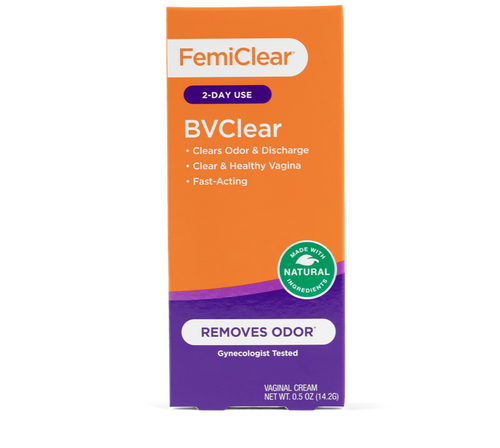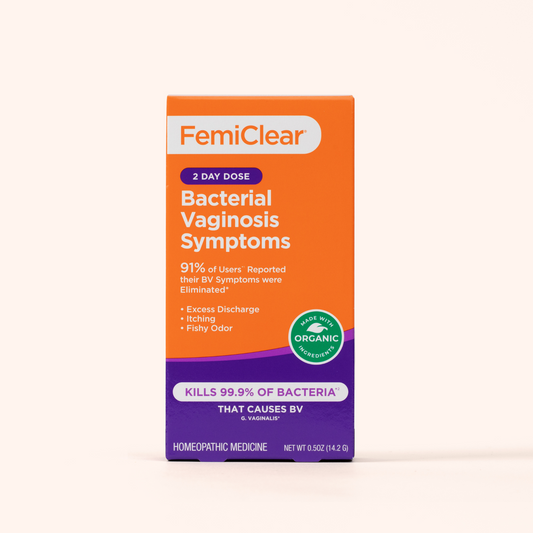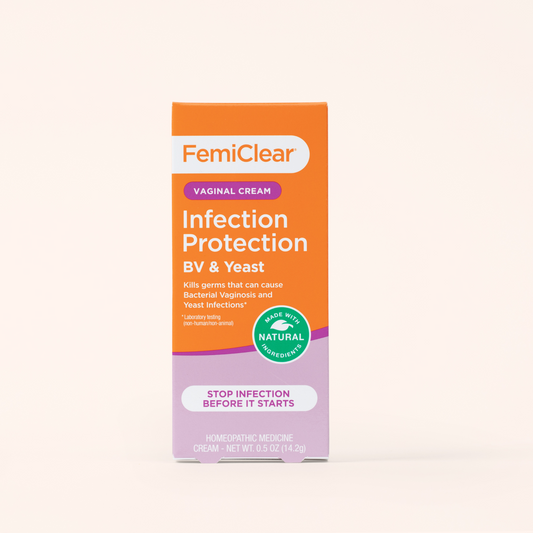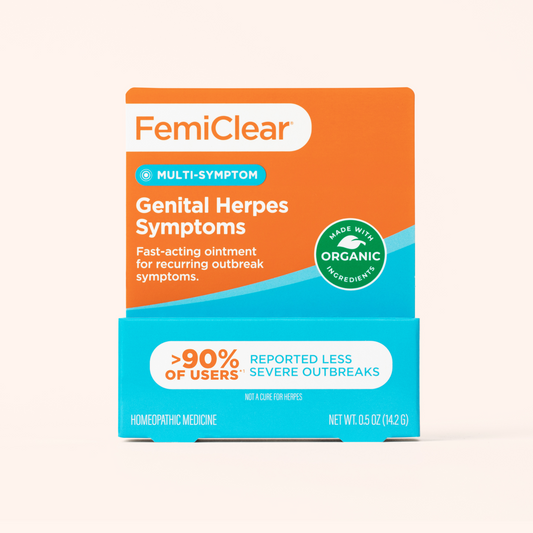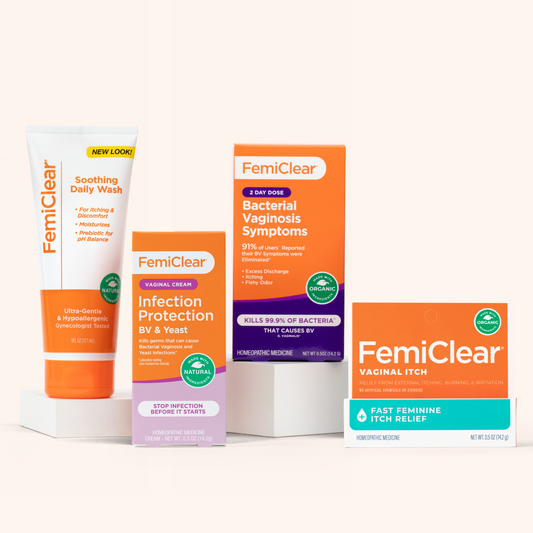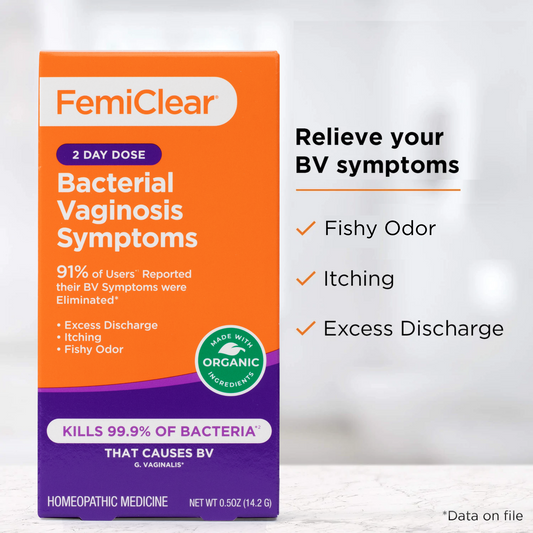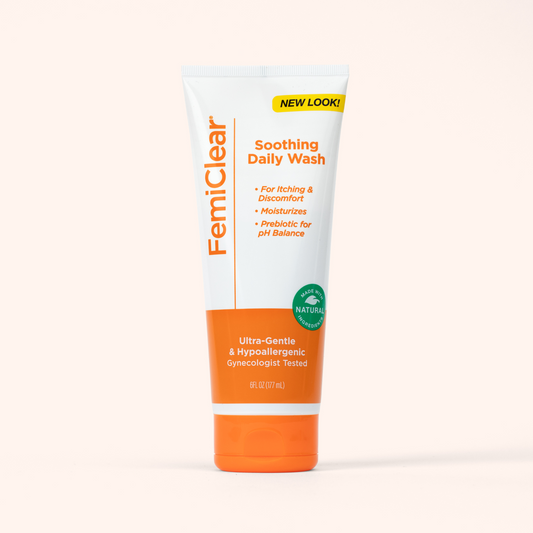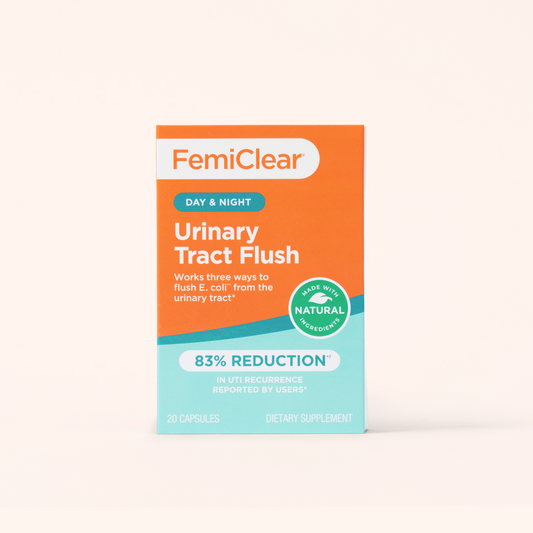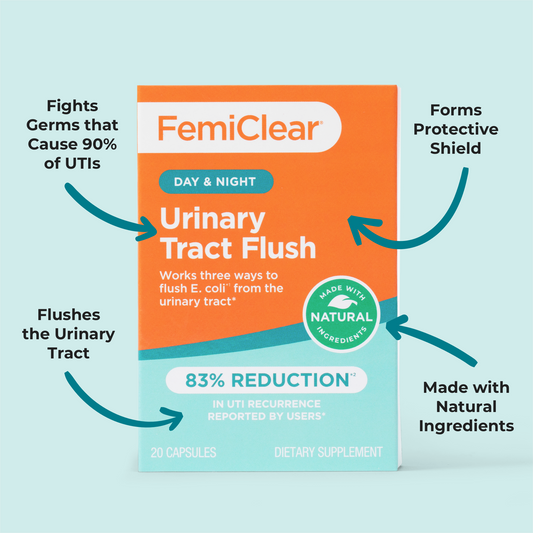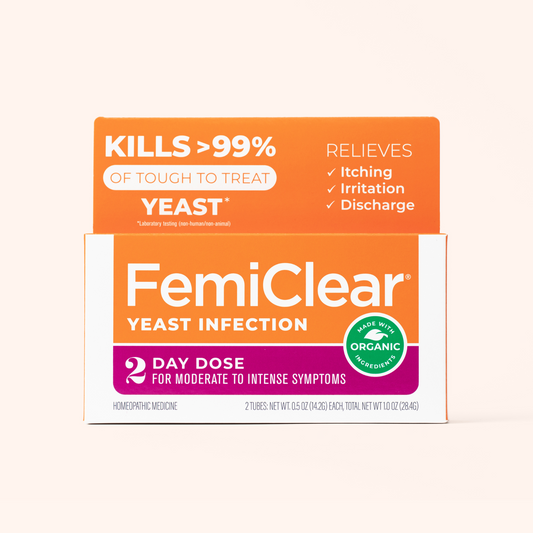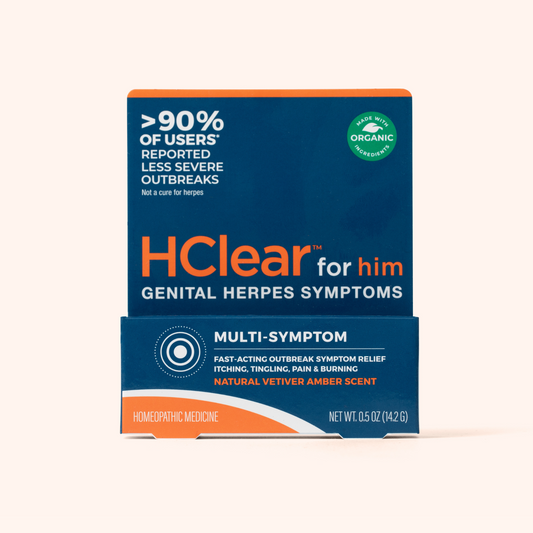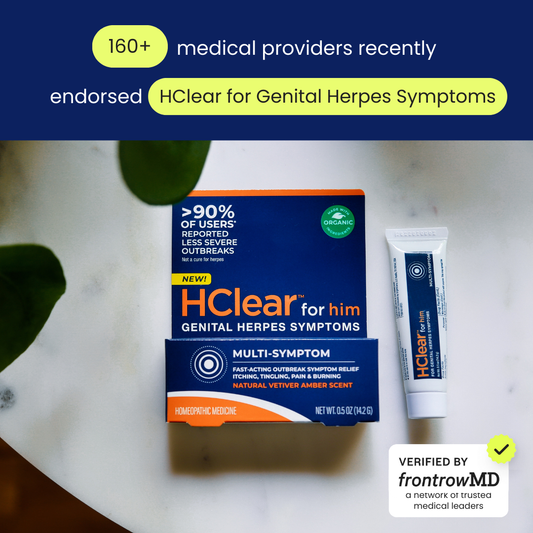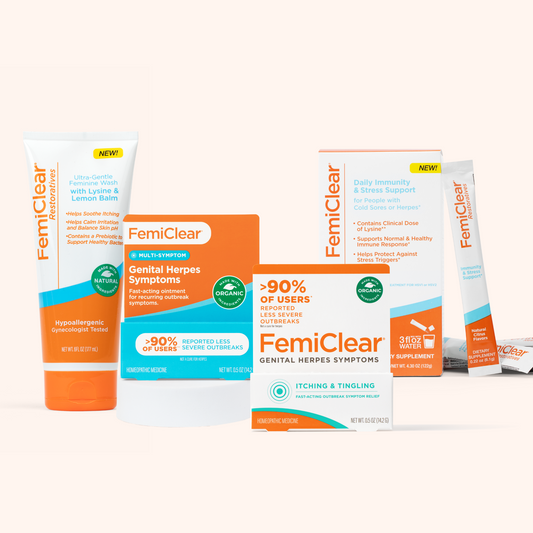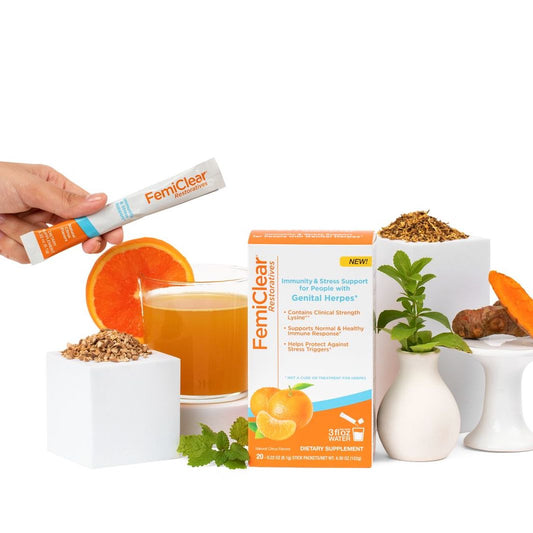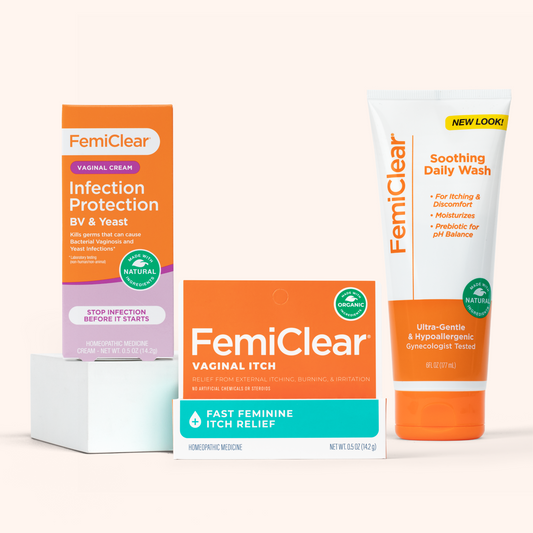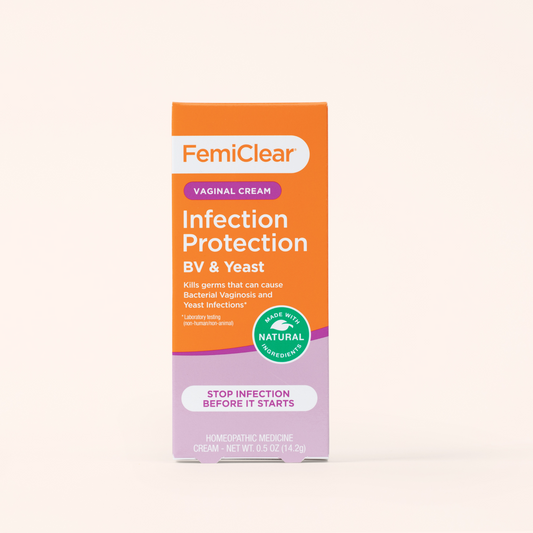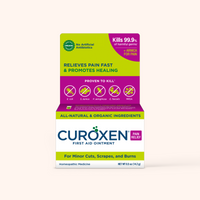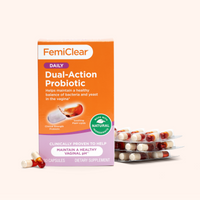Table of Contents
Can Bacterial Vaginosis Cause Urinary Tract Infection Symptoms?
Written by Julia Pelly May 16, 2023

Bacterial Vaginosis (BV) and urinary tract infections (UTIs) are both common and unpleasant infections that many women deal with at least once in their life. While 1 in 3 women will be diagnosed with BV at some point (and about 80% of those women will be diagnosed more than once), around half of all women will experience a UTI at least once.
Both BV and UTIs can cause uncomfortable symptoms, but each comes with some distinct sensations and symptoms that can help you determine which you are being impacted by. They also differ in regard to what causes the infection and how it can be treated. Read on to find out all about what makes BV and UTIs unique and how you can tell the difference between symptoms caused by each.
The Basics of Bacterial Vaginosis
All vaginas are populated by a variety of bacteria. When this bacteria is present in the right amount, it helps keep the vagina healthy. When an imbalance occurs and the levels of bacteria begin to rise outside the range of normal, it can lead to bacterial vaginosis and the unpleasant symptoms it’s known for.
What causes bacterial overgrowth to occur?
Anything that changes the pH of the vagina can impact bacteria levels, but what causes these changes can differ from person to person. BV is not sexually transmitted but being sexually active is a risk factor since semen and the introduction of new sex partners can disrupt the vaginal microbiome. Other common behaviors that can increase the risk of BV include:
-
Douching
Douching can both eliminate too much “good” bacteria in the vagina and lead to inflammation which can increase your risk for BV. -
Restricting airflow to the vaginal area
Vaginas need to ‘breathe,’ so avoiding things like nylon underwear or tight workout gear can lead to a greater likelihood of getting BV. -
Staying in damp clothing
Bacteria are more prone to overgrowth in warm, damp areas. Changing promptly after working out and getting sweaty or swimming can help reduce your risk of developing BV. -
Using soaps with dyes, perfumes, or additives
Using soap with lots of ‘extras’ can upset your vaginal pH and cause irritation in your more intimate areas. Choosing a mild soap instead of one with additives, perfumes, or dyes can help you avoid BV. -
An incomplete diet
If you’re already prone to BV, a diet lacking in nutrients can make it hard for your body to heal, stay healthy, and avoid recurrent infections. Doing your best to eat a nutrient-dense diet can help you stay healthy and reduce your risk of BV.
The Basics of Urinary Tract Infections
Urinary tract infections occur when bacteria get into the urinary system, multiply and then cause inflammation, infection, and pain. UTIs can occur anywhere in the urinary system, including the urethra, bladder, ureters, or kidneys. Some things that can increase the risk of developing a UTI include:
-
Being sexually active
UTIs are not sexually transmitted but being sexually active does increase your risk as sexual activity can introduce or move germs from the vagina to the urethra. Using some forms of birth control Using spermicide can disrupt the vaginal microbiome and make you more susceptible to developing a UTI. -
Being pregnant
The physical and hormonal shifts that occur during pregnancy can change the bacteria in the urinary tract and make it more difficult for women to totally empty their bladder. This combination can make UTIs more likely. -
Having diabetes or other conditions that impact the immune system
Any conditions that impact your immune system can make you more susceptible to UTIs; diabetes can be particularly challenging because it impacts the immune system and causes nerve damage that makes it more difficult to fully empty your bladder.
What Symptoms Do BV and Share?
Both bacterial vaginosis and urinary tract infections can cause uncomfortable and sometimes painful symptoms. Though each has some distinct symptoms, there are some that both of these types of infections share. Some symptoms that can occur with both BV and UTIs include:
- Lower abdominal or pelvic pain
- Vaginal or pelvic discomfort
- A change in the smell you notice in your vaginal area
If you notice any of these symptoms, it can be helpful to consider them in conjunction with whatever other symptoms or sensations you might be experiencing as you consider whether you may have BV or a UTI.
What Symptoms are Unique to BV?
Bacterial vaginosis often comes with a set of symptoms that do not occur with a UTI. Symptoms that are caused by BV but are not a UTI include:
- A greysh-white discharge
Abnormal discharge can be an indicator of bacterial vaginosis but not of a UTI; UTIs do not cause gray or white discharge. - A fishy or foul odor
A fishy or foul odor is often one of the symptoms of BV that women notice first. While UTIs can change the odor of your urine, UTIs are not associated with a fishy smell. - Pain or itching in or around the vagina
Bacterial vaginosis can be quite uncomfortable; it is often associated with pain, itching, and burning in or around the vagina. While UTIs can cause pelvic discomfort or pain, their list of symptoms does not include itching or pain in the vagina.
What Symptoms are Unique to UTIs?
Like bacterial vaginosis, urinary tract infections generally present with some symptoms that set them apart from other vaginal infections. Symptoms that are caused by UTIs but not BV include:
-
Frequent urination
Frequent urination or the feeling of having to urinate even when your bladder is empty is extremely common when a UTI is present but is not associated with BV in any way. -
Back or abdominal pain, pressure, or cramping
Depending on which part of the urinary tract is infected you may be more or less likely to experience lower back or abdominal pain when you have a UTI. If you have BV you likely won’t experience abdominal or back pain unless you have another infection or problem at the same time. -
Blood in the urine
Bleeding is not a symptom of BV. If you notice blood in your urine your doctor will likely test to see if you have a UTI. -
Fever, chills, nausea, and vomiting
If you have a kidney infection (a type of urinary tract infection,) you may experience symptoms like fever, chills, nausea, and vomiting. If you have BV you will not experience these symptoms unless you have a different problem that is also happening at the same time.
Managing and UTIs
While no one likes getting a vaginal infection, both bacterial vaginosis and urinary tract infections are generally simple to manage with the right support. If you start to feel “off,” take a look at your symptoms and reach out to your healthcare provider for information about how you can manage what’s going on.
Both urinary tract infections and bacterial vaginosis can be treated with antibiotics, though many people are wary of the side effects that antibiotics can cause. If you'd rather try natural remedies first, there are several good options.
Studies show that 25% to 42% of UTIs will go away on their own without antibiotics and doing things like drinking lots of water can help flush out the bacteria more quickly. Cranberry-based over-the-counter products can also help shorten the length of discomfort or reduce your discomfort as you wait for the infection to pass on its own.
Bacterial vaginosis symptoms can be managed by several over-the-counter options including using boric acid or Femiclear’s BV remedies.
Boric Acid works by adjusting the pH of the vagina and can be an effective treatment for BV, though it generally takes at least a month of treatment for most people to see their symptoms disappear and can take up to 12 weeks or more for some. With uncomfortable symptoms that can be seriously disruptive to life, many women want relief more quickly than boric acid can offer.
The FemiClear bacterial vaginosis remedy is an over-the-counter option that is proven to eliminate symptoms in 91% of users and kill 99.9% of the bacteria that cause bacterial vaginosis. This option is appealing to those who want symptom relief that is both quick and effective.
How Can You Optimal Vaginal Health
Being diagnosed with BV makes you more likely to be diagnosed again in the future. Likewise, developing a UTI increases your risk of a future UTI. There are things you can do to prevent BV or a UTI as well as maintain optimal vaginal health.
You can decrease your risk of UTIs by staying well hydrated, urinating after sex, and wiping from front to back when you use the bathroom. If you have had multiple UTIs you may also want to look into what other specific behaviors or situations seem to trigger them.
To lower your risk of bacterial vaginosis you can eat a whole and nutritious diet, avoid douching, increase air-flow to your vaginal area, and avoid wearing damp or sweaty clothing for prolonged periods of time. If you’ve had several incidences of BV you also may want to consider if there seems to be a trigger.
Maintaining a healthy vaginal pH and microbiome can help lower your risk of all kinds of vaginal infections. FemiClear offers several products that can help maintain a healthy vaginal environment.
FemiClear’s Feminine Wash is designed to soothe vaginal itching and irritation from multiple causes. This intimate wash is ultra-gentle and hypoallergenic and is designed to cleanse, freshen, and moisturize to relieve external dryness and discomfort. Because of its unique prebiotic blend, it is pH balanced and won't disrupt the natural vaginal pH.
While most vaginas are fairly low maintenance, there are times when taking a more hands-on approach to getting and staying healthy can make sense. If you’re worried about BV or UTIs it’s important to know that there are both healthcare providers and products that can help you feel better quickly.
Written by Julia Pelly May 16, 2023

BVClear for Vaginal Odor | Cream
Relief from Odor and Discharge in 24 Hours
Learn More